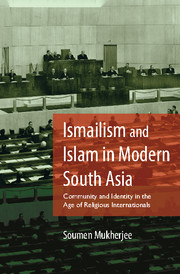 Ismailism and Islam in Modern South Asia
Ismailism and Islam in Modern South Asia Book contents
- Frontmatter
- Contents
- Acknowledgements
- List of Abbreviations
- Glossary
- Note on Transliteration
- Introduction
- 1 The Khoja Ismailis and Legal Polemics Religion and Customs in Nineteenth Century Bombay
- 2 The Howardian Moment Morality, Aryanism and Scholarship
- 3 Pan-Islamism and an Asiatic Spirit Postnational Subjectivities in an Age of ‘Transition’
- 4 The Hazir Imam, Ismailism and Islam in Late Colonial South Asia
- 5 The Importance of Being Ismaili Religious Normativity and the Ismaili International in the Age of Global Assemblages
- Concluding Reflections
- Select Bibliography
- Index
4 - The Hazir Imam, Ismailism and Islam in Late Colonial South Asia
Published online by Cambridge University Press: 23 July 2017
- Frontmatter
- Contents
- Acknowledgements
- List of Abbreviations
- Glossary
- Note on Transliteration
- Introduction
- 1 The Khoja Ismailis and Legal Polemics Religion and Customs in Nineteenth Century Bombay
- 2 The Howardian Moment Morality, Aryanism and Scholarship
- 3 Pan-Islamism and an Asiatic Spirit Postnational Subjectivities in an Age of ‘Transition’
- 4 The Hazir Imam, Ismailism and Islam in Late Colonial South Asia
- 5 The Importance of Being Ismaili Religious Normativity and the Ismaili International in the Age of Global Assemblages
- Concluding Reflections
- Select Bibliography
- Index
Summary
The example of the Prophet and of Abu Bakr and Omar and Ali should convince these pious people that the first duty of a Moslem is to give his time to the service of nation and not merely to silent prayers.
His Highness Aga Khan III, 1902The choice of the historical examples cited above is redolent of at least two crucial aspects that defined Muslim history in late colonial South Asia. First, it is reflective in general of the much persuasive rhetoric of an Islamic activism embedded in an Islamic normativity that marked a process of a gradual shift from ‘other-worldly’ to ‘this-worldly’ piety. In the process it emphasized the importance of self-affirmation and development of self-consciousness that characterized the history of Islam in South Asia and large parts of the Muslim world in the nineteenth and twentieth centuries. Second, the invocation of the key Sunni figures by the spiritual head of a Shia denomination symptomizes a complex, and somewhat strategically syncretistic, ecumenical venture in late colonial South Asia within the framework of an inclusive Muslim ‘nation’. The gradual shift from a certain other-worldly to this-worldly religious experience, as Francis Robinson illustrates, rested upon four conceptual planks: self-instrumentality, self-affirmation, affirmation of ordinary life and a certain inward-turn accompanied by a growth of self-consciousness and reflexivity. In the previous chapter, we have merely gestured at the relevance of these four intertwined themes in Muslim life in the late colonial times with a particular reference to the assertion of human intellect and interpretive possibilities. In this chapter, however, we draw upon the case study of Aga Khan III and discuss one specific aspect of Muslim life in colonial South Asia, viz., the conceptualization of the community in political terms of a ‘minority’, even as different sectarian and denominational formations sought to reposition themselves within that wider rubric. In doing so we elaborate on the creative possibilities, which both defined and signified the gradual shift towards a ‘this-worldly’ Islam.
The thematic concerns that propelled the shift towards a this-worldly experience were activated through an invocation of select historical examples, and informed both the ecumenical endeavour as well as the interdenominational dialogues.
- Type
- Chapter
- Information
- Ismailism and Islam in Modern South AsiaCommunity and Identity in the Age of Religious Internationals, pp. 114 - 145Publisher: Cambridge University PressPrint publication year: 2016


